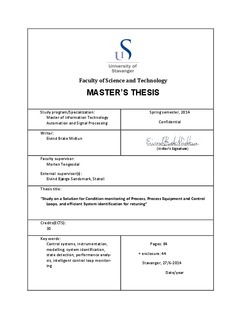Study on a solution for condition monitoring of process, process equipment and control loops, and efficient system identification for retuning
Master thesis
Permanent lenke
http://hdl.handle.net/11250/274691Utgivelsesdato
2014-06Metadata
Vis full innførselSamlinger
- Studentoppgaver (TN-IDE) [866]
Sammendrag
The presented thesis serves as part of a technology development program by Statoil ASA. The idea behind the technology seeds back several years, and is a product of hands- on- practical experience. Extensive experience has indicated feasibility of more work toward understanding the principles in action and approaching a practical solution for use on physical plants.
The idea is registered internally at Statoil with Statoil reference K4064, and the current intellectual property strategy requires all information relating this idea, including this master thesis, to be qualified as ‘Confidential’.
Introduction to the technology plan [1] defines the prime motivation of the technology development:
There is a growing motivation for monitoring control loop performance and for a change in maintenance strategy towards more condition based maintenance. Monitoring control loop performance and equipment condition enables for early action when deterioration of a control function starts developing, i.e. before the developing fault(s) or changes in process characteristics has had a significant negative effect on business.
The proposed technology is a practical method for superficial system identification and technical/operational state detection, with the goal of optimizing process component maintenance, and control loop retuning. The vital components of the plan will be properly detailed in the thesis outline, 1.3, with the associated deliverables and constraints. A description of the proposed test mechanism will be provided under the theory chapter, 2.3.
Also as part of the same Statoil Technology Development program, a bachelor thesis [2] was conducted in 2010, by Espen Svandalsflona and Frode Tuen associated with the University of Stavanger, concluding among other topics that more study on the results criteria for making the maintenance decisions would have to be made and review changing several process parameters in combination. Additionally it would need to be proved that oscillations induced by the proposed test mechanism would not upset other parts of the process to such a degree that the de-sire for increase of product quality, effectiveness and the cost advantages, would be overshadowed by the potential performance loss associated during the testing. The latter topic will not be discussed in this thesis due to the time constraint.
Beskrivelse
Master's thesis in Cybernetics and signal processing
